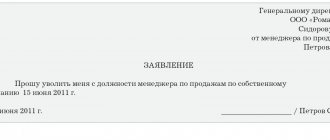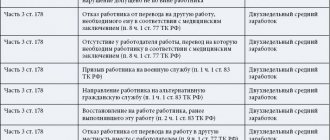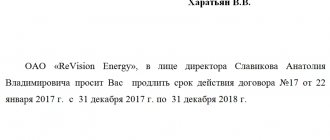Is it possible to work on a well-deserved rest?
In Russia, pensioners are persons who have reached a certain age (women - 55 years, men - 60 years) . These citizens are entitled to a pension benefit.
If a citizen has not applied for benefits in a timely manner or receives a pension, for example, for disability, then he is not an old-age pensioner.
People who are pensioners have the right to self-realization and work. The right cannot be infringed due to age-related changes. This rule is clearly explained by Article 3 of the Labor Code of the Russian Federation.
Pensioners can work under both a fixed-term employment contract and an indefinite one. In the first case, there are certain registration conditions, violation of which can cause serious material damage in the form of a fine. An open-ended contract is concluded according to the standard scheme .
How long before retirement can an employment contract be terminated?
How many years before retirement can an employee be fired and can, for example, be fired a year before retirement? Starting in January 2021, legislation came to protect persons called pre-retirement pensioners (when there are 5 years left before reaching retirement age).
The norm of Art. 144.1 of the Criminal Code of the Russian Federation introduced criminal liability for employers who violate the procedure for dismissing this category of workers (for example, requiring employees to resign of their own free will or dismissing for minor labor misconduct).
However, on the grounds established by Art. 81 of the Labor Code of the Russian Federation, have the right to dismiss regardless of whether he has reached retirement age or whether he has 1 to 5 years left before it . For example:
- liquidation of an organization or downsizing;
- the employee has not completed the probationary period;
- he has a record of gross violation of discipline and guilty actions;
- the manager or chief accountant resigns due to a change in the owner of the enterprise, etc.
Read more about dismissal of employees of pre-retirement age here.
In what cases is a fixed-term agreement concluded?
It is possible to conclude a fixed-term contract if the work is seasonal or temporary. This requires the consent of both parties: the employer and the employee (Article 59 of the Labor Code of the Russian Federation, part 2).
At the initiative of the employer, it is not possible to conclude a fixed-term contract in this situation. This is due to the fact that after its end, the pensioner can go to court and ask to recognize the contract as indefinite. There is a high probability that the case will be won.
If the conditions and nature of the work do not contradict the drawing up of an open-ended contract, then the employer does not have the right to refuse . Otherwise, it is considered an administrative violation leading to penalties.
Attention! A probationary period is provided if the duration of work is more than two months. In other situations, the appointment of a probationary period is illegal (Article 70 of the Labor Code of the Russian Federation).
The specifics of drawing up a fixed-term employment contract while replacing another employee are written here.
Features of terminating a fixed-term employment relationship with a beneficiary
Part 3 of Article 80 of the Labor Code of the Russian Federation establishes the position: if it is impossible to continue working, in particular upon retirement, the administration is obliged to satisfy the pensioner’s request for dismissal without fourteen days of service and dismiss him on a date that he independently chooses.
When applying for dismissal, the pensioner must indicate the appropriate reason. If the senior citizen does not do this, then in case of absenteeism, he may be fired for absenteeism.
Controversial issues of dismissal of a pensioner in judicial practice
Judicial practice contains an interesting example. A pensioner, who has been in this status for several years, sent a statement in which he indicated the date of dismissal, attached a copy of his pension certificate, sent it by mail and decided not to go to work anymore. The administration sent him a telegram, asking him to explain the reasons for his absence. The employee replied that he considered himself fired by the date he indicated, because... is a pensioner. The administration regarded this behavior of the beneficiary as a disciplinary offense and fired him as a truant. The court supported the administration.
The dismissal of a pensioner occurs at the initiative of the employee.
By making a record of dismissal in the work book under clause 3, part 1 of art. 77 of the Labor Code of the Russian Federation, the reason for dismissal should be indicated by adding the phrase “in connection with retirement . This may seem like reinsurance, but this entry will not be superfluous. The legislator does not specify exactly whether an employee has the right to leave one or more times without working for this reason.
Judicial practice on the dismissal of a pensioner without service
Judicial practice believes that the only time a pensioner can quit is without working for two weeks. When registering a dismissal, take into account this feature: an employee has the right to resign due to retirement once, but it is not absolutely necessary that this will happen immediately after the pension is issued.
If there is no mention of dismissal due to retirement in the work book, then the court may regard this as the fact that the employee has not yet exercised this right. And in the example indicated in the paragraph above, the court already recognizes the actions of the administration as not complying with the law.
Thus, a fixed-term employment contract for pensioners is a right, not an obligation for participants in labor relations. Objective reasons and grounds, other than the very fact of accepting the pensioner, are not required, for which the joint expression of the will of the parties is sufficient.
Remember: an employer cannot insist on urgency in the relationship, nor can it refuse to hire you.
Why is the employee's voluntary consent required?
If such consent is properly documented in writing, then no charges related to age discrimination can be brought against the employer.
However, if any disputes arise, the employer will have to prove in court the need to conclude a fixed-term contract with the pensioner , indicating objective reasons.
In this regard, when hiring people of retirement age, it is necessary to be guided by their desire to find employment for a certain period, for example, one year. The reasons may be different: health status or lack of attachment to earnings.
Structure and content of the contract
After the visa is affixed to the application, an employment contract is signed. The contract reflects the main provisions of civil contracts .
What points are present in the document? These include:
- Personal information of the employer (organization name, code) and employee (full name).
- Date and place of document preparation. The day on which the employee begins fulfilling his work obligations.
- Data from the employee’s passport and information about the employer’s company (TIN and other documents).
- Working conditions. The address of the workplace, position, functional responsibilities and other information are indicated here.
- Validity.
- Terms of payment. The salary amount or the cost of work per hour is indicated in numbers and words.
- Duration of work and rest time. Here they indicate the work schedule, irregular working hours (if such is the case) and other nuances.
Important! The difference between a fixed-term contract and an open-ended one is the presence of an end date for employment.
You can find out about the contents of an employment contract in the Russian Federation here.
A nuance associated with this contract for hiring a citizen from this category
If there is a valid fixed-term employment contract with a pensioner on the performance of labor duties by the pensioner, the employer does not have the right to dismiss him or change the grounds for the current agreement on his own initiative, except in cases of disciplinary action. These actions are allowed only at the initiative of the pensioner.
Is it possible to conclude an employment agreement with such a person?
Is it possible to conclude such agreements? Of course, if the circumstances of the employee’s activities provide for a time limit, such an agreement can be concluded both with a pensioner and with a person who has not reached retirement age.
In the event that the employer is not confident in the strengths and capabilities of an employee of mature age, he has the right to conclude a fixed-term contract.
There are no restrictions in the formalization of these labor relations; the main thing is the consent of both parties.
At the same time, the norms of Art. 58 of the Labor Code of the Russian Federation prohibit labor relations with limited terms, based not on objective reasons, but on the employer’s desire to deprive the employee of social guarantees.
Voluntary consent to conclude a fixed-term contract
In order for the employer to be limited from accusations of discrimination against a certain category of employees, it is necessary to take into account the effect of the provisions of the law reflected in paragraph. 13, part 2 art. 59 Labor Code of the Russian Federation. To do this, it is necessary to draw up an agreement between the parties regulating the regulations of labor relations, in accordance with Part 2 of Art. 59 Labor Code of the Russian Federation.
If labor disputes arise, the employer will need to provide an explanation of the reasons that led to the conclusion of a fixed-term contract where there is no need to conclude it. According to the court decision, this circumstance can be canceled, and the terms of employment of the employee are recognized as unlimited.
Therefore, when applying for a pensioner’s position, the right to choose an applicant who expresses a desire to be employed for one year is recognized as valid, for example:
- due to health reasons;
- since there is no need to be tied to earnings.
These and other reasons seem to come from the applicant’s side, creating the employer’s need to apply for a job for no more than a year.
In what cases is this possible?
In this section we will discuss in what cases is this possible? According to Art. 37 of the Constitution of the Russian Federation, citizens have the right to choose their type of activity, profession and work regime.
Therefore, if a pensioner writes to the employer an application for employment for a certain period, then the employer has the right to satisfy such a desire, at its own discretion, without violating the law.
At the same time, in the job application it should be indicated that for health reasons a temporary job is recommended.
Documents required when concluding such a contract
There are no special requirements for this category of applicants. The standards for accepting documentation are limited by Art. 65 Labor Code of the Russian Federation. Documents include:
- passport;
- diploma (other educational document);
- employment history;
- TIN and SNILS;
- medical record (if necessary).
The employer has the right to request other documentation related to the issue of employment.
But this list does not include a pension certificate and other documents defining this status. The listed documents in the form of originals and copies are attached to the application and agreement of the parties.
When a pensioner is employed, an entry in the work book is made in the standard way, without indicating the date of dismissal.
Structure and content of the employment agreement. Sample filling
After the personal signature of the manager confirms the application for taking up the position, an employment contract is drawn up.
Its structure has the form of an official document reflecting the main provisions of civil contracts concluded by the parties.
All obligations of the parties are reflected in the essential provisions, formalized in separate paragraphs.
The contents of the points are as follows:
- FULL NAME. employee and employer , indicating the name of the organization and its code. They are defined as the parties to the contract being concluded - counterparties.
- Passport details of the employee and the employer - entrepreneur or representative of the founder. TIN of a legal entity or individual entrepreneur.
- Date and place of compilation. Day of taking on official duties. It may not coincide with the date of the agreement.
- Contract time.
- Conditions for hiring an employee , indicating the actual address of the workplace. The position, rank and other relevant information are also indicated here. The functional responsibilities and competencies required to take up the position are also indicated.
- Norms of working time and rest time , indicating the presence of shift work, irregular days and other non-standard conditions.
- Payment is indicated in numbers and words. The basic part or salary is established, and if necessary, additional payments. If the payment is hourly, the cost of one hour of work.
After the listed points, the signatures of the counterparties are placed, with an explanation of the surname. The employer puts the seal of the organization.
ATTENTION: The main difference between a fixed-term contract is the indication of the date of dismissal, when the labor relations of the counterparties lose legal force.
When is it issued without specifying deadlines?
If an open-ended contract has been concluded with a pensioner, the employer does not have the right to force the former to renew it.
Such an agreement can be concluded at the request of both parties, if the employer has no doubts about the working capacity of an employee of retirement age. And the pensioner assures that he will fulfill his duties in full and properly.
The form and content of an open-ended employment agreement have an identical structure to a fixed-term one . The only difference is that a fixed-term contract contains a specific date for termination of the employment relationship, while an open-ended contract does not contain such data.
On the pages of our portal you will find information about the specifics of concluding an employment contract with a foreigner, a remote worker, a part-time worker - internal and external, as well as with a minor worker.
The procedure for terminating a contract with such an employee
How is it possible and can they legally dismiss such an employee from work? The procedure for dismissing a working pensioner generally does not have a special algorithm and consists of the following stages:
- The emergence of grounds for dismissal.
The reason must be documented. These are:
- employee resignation letter;
- notification from the head of the organization about liquidation or reduction (submitted 2 months before the start of the listed actions);
- notification of expiration of a fixed-term contract or failure to complete the probationary period (3 days before dismissal);
- a written agreement between the retired employee and the head of the organization on dismissal;
- documents on the basis of which the employment contract can be terminated in accordance with Art. 83 (medical report, emergency circumstances, etc.).
- Issuance by the head of the organization of the Order of dismissal.
The head of the organization, having accepted the resignation letter or initiated dismissal on the grounds provided for in Art. 81 of the Labor Code of the Russian Federation, as well as having signed an agreement to terminate the employment contract, must issue a special act - an Order of dismissal.
The basis of the order is:
- form T-8, established by Resolution of the State Statistics Committee of the Russian Federation dated January 5, 2004 No. 1;
- a form established by the organization individually during the approval of primary documents (allowed since 2013).
The said act must contain the following information:
- date of termination of the employment contract;
- information about the dismissed employee (full name, position);
- the reason for termination of the contract;
- link to the document grounds for dismissal.
The document must be signed with a transcript by the manager and the dismissed employee.
- Working out when leaving at your own request.
If the dismissal is made in connection with retirement (at one’s own request), then in accordance with Part 3 of Art. 80 of the Labor Code of the Russian Federation is not required. The employment contract with the retired employee will be terminated on the day specified in the application.
- Filling out personnel documents.
An important step is filling out personnel documents, which include a work book and an employee’s personal card.
- Calculation.
As a general rule, the amount of payments includes only wage balances and compensation for unused vacation. Additional payments are due upon dismissal:
- in connection with liquidation;
- due to reduction;
- by agreement of the parties (if this is established by the employment contract or agreement).
A pensioner who resigns for the first time after reaching retirement age has his pension recalculated (the increased rate begins to be paid three months after dismissal).
Read about the recalculation of pensions upon dismissal of a pensioner here.
In addition, a local act of the organization may establish additional payments to employees resigning in old age.
Filling out personnel documents: entry into employment and personal cards
The procedure for filling out a work book is established by Resolution of the Ministry of Labor of Russia No. 69. The wording of the entry made in this document will depend on the basis for dismissal.
Important! If the pensioner filed for the first time an application for resignation of his own free will in connection with retirement, then column 3 of the work book will contain the following entry: “dismissed of his own free will in connection with retirement, clause 3. part 1 of Art. . 77 Labor Code of the Russian Federation."
Accordingly, column 4 will contain a reference to the Order of Dismissal.
In other cases, general wording will be used containing the reasons for termination of the employment contract and a reference to the norm of labor legislation, for example: “dismissed due to a reduction in the number of employees of the organization, clause 2, part 1, art. 81 Labor Code of the Russian Federation."
The personal card is filled out according to the T-2 form or another form established along with the primary documents.
Item 9 of the personal file must contain the following information:
- reason for leaving work;
- date;
- link to the Order;
- the signature of the HR employee and the signature of the person being dismissed with a transcript.
Due to retirement
A retired employee who did not resign after reaching retirement age has the right to leave work in connection with retirement. The procedure as a whole will not be any different, except for the wording in the documents and the fact that the employer does not have the right to force such an employee to work 2 weeks after submitting the application.
- Submitting an application.
Practice shows that an application should be submitted at least 3 days in advance so that management can complete all personnel documents and make payments on time.
The main part must include the wording “I request you to resign at your own request due to retirement.”
- Order and execution of personnel documents.
As mentioned above, the work book must also contain language about retirement. This is necessary in order to recalculate pension payments. It is important to note that the employee will not be able to resign a second time “due to retirement”: the procedure for terminating the employment contract will be carried out in accordance with the general procedure.










